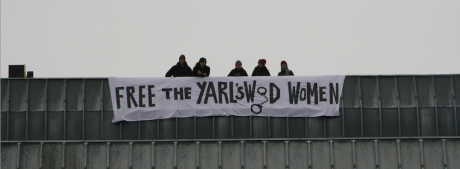
Saturday, 5th of March 2011.
Yarl’s Wood continues.
The women behind the fences are saying something about their children, but it is difficult to hear what exactly. They seem to be shouting something about their right to stay with their children. Perhaps they are referring to the effects of recent policy changes.
In October, a case was brought forth on behalf of two single mothers and their children who were detained at Yarl’s Wood by UK Border Agency (UKBA) officers after dawn raids on their homes earlier in the year. In December 2010, in response, the government `signaled’ its intention to bring to an end children’s detention. This included closure of the ‘family unit’ at Yarl’s Wood Immigration Removal Centre and the suspension of children’s detention in any immigration facility over the Christmas period.
In January 2011, a court decision established that the detention of some families, including children in Yarl’s Wood, was unlawful. This decision required the government to bring to an immediate end the detention of children in immigration removal centers. The immediate response from the Home Office was that the detention of families ‘would be kept to a minimum’, while officials drew up ‘alternative arrangements’ to ‘protect the welfare of children without undermining immigration law’.
We demonstrated outside Yarl’s Wood partly to denounce the government’s ‘skillful’ use of publicity about ‘ending the detention of children’ as a way of avoiding talking about the brutal and inhumane detention regime in general. But even among some of the civil society groups that have specifically supported the end of children detention, suspicions remain concerning the government’s version of “alternatives” to child detention. While the plan does not include any concrete improvement in terms of early access to legal aid for refugee applicants, it does mention the establishment of ‘new family conferences’. These would ‘draw in lawyers, social workers and others’, with the aim of providing ‘realistic advice to people who had been refused refugee status on what their options were’. For those who would not accept voluntary repatriation “it would be necessary to detain them in ‘secure accommodation’ for periods of around 72 hours to ensure that their departure could be enforced’.
Migrant Rights Network argues that the ideas of ‘family conferences’ and a new ‘independent family review panel’ is dangerous. It is quite easy to imagine that the large-scale detention of families with young children will be simply reproduced in a new form. Furthermore, these family conferences risk turning exactly those social workers and other experts who should support migrants’ children and vulnerable adults’ welfare in their communities, into immigration control functions. Those who used to work for migrants in our communities will be absorbed into the machine of control and detention, ultimately ‘advocating’ ‘voluntary’ return and deportation.
The rhetoric of the UK government around the economic recession legitimizes increasingly restrictive policies against migrants. This then naturalizes chauvinistic and militaristic approaches towards the ‘management’ of immigration as part of the ‘big society’ discourse about having to ‘share’ the consequences of the economic downturn. Of course, `they’ must pay more than `us’. The politics of racism and gender discrimination are fully at play in this era of mobility restrictions and economic austerity.
Walking back from the fences we discuss the contradiction of today’s migration politics and how grassroots groups should respond to it in practice. Yes, we will probably have to support migrant’s individual demands for regularization but cannot afford to support the whole policy/ing logic based on the continuous differentiation of migrants, the production of multiple divisions, between the ‘good’ and the ‘bad’, the more and the ‘less vulnerable’, those who ‘deserve’ integration and those who do not, or simply the right to access that which seems to become an ever increasingly ‘precious good’, conceded by national governments in Europe, that is, the status of ‘legality’.
Many women currently detained in Yarl’s Wood have worked and toiled in this county already for many years. They are fluent in English. They have kids here. Here they have built their lives. This makes us particularly angry and astonished in front of the injustice of their detention, but it does not change the unconditionality of our claim: freedom of movement for all. Everyone, independent off period of stay and status, whether escaping poverty or war, environmental disaster or political persecution, gender or racial oppression, has the right to freedom of movement, and freedom to stay and search for a new life. After all, as we would remind the small group of police engaged in their performance of ‘protecting’ the prison from us, we are all the children of migrants.
(Photo Credit: womenagainstrape.net)
